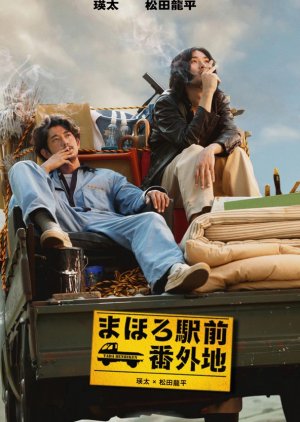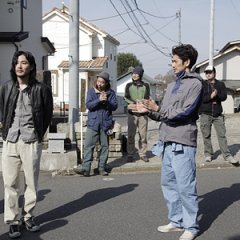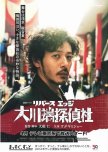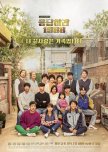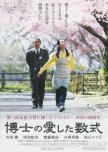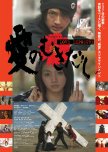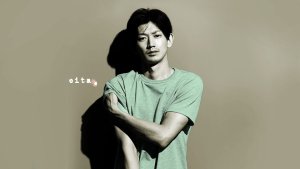 A Stalker's Guide to EITA
A Stalker's Guide to EITA Situés dans la ville fictive de Mahoro, Keisuke Tada et Haruhiko Gyoten sont deux trentenaires divorcés qui dirigent une entreprise de "benriya" (petits boulots à louer). La série dramatique décrit leurs interactions avec les clients de leur agence, située en face d'une gare. (Traduction: MyDramaList) Modifier la traduction
- Français
- English
- magyar / magyar nyelv
- dansk
- Titre original: まほろ駅前番外地
- Aussi connu sous le nom de: Mahoro Eki Mae Bangaichi ,
- Scénariste et Réalisateur: One Hitoshi
- Genres: Comédie, Vie quotidienne
Distribution et équipes
- Nagayama EitaTada KeisukeRôle principal
- Matsuda RyuheiGyoten HaruhikoRôle principal
- Miura MasakiYoshimura [Detective]Rôle Secondaire
- Matsuo Suzuki"Shin-chan" [Drug and weapon smuggler]Rôle Secondaire
- Watanabe Makiko"Mama" [Snack bar owner]Rôle Secondaire
- Omori NaoYamada [Bento shop clerk]Rôle Secondaire
Critiques

So what is this about? It’s a story about “Benri-ya” which literally means “handy men”. The two main leads are given certain jobs to accomplish and they get involved in various adventures through their clients’ requests. It’s a concept that’s not very unique since I am sure that many of you saw dramas where the main leads are “problems-solvers” where they get into contact with many characters and go through various situations to achieve their missions.
However, what shines in that episodic pattern is that our main leads don’t get involved in their clients’ lives to be sacred savers, heroes or creators of happy ever after endings. Even the side characters are Mahoro’s ordinary people and job requests don’t demand anything heroic to pull through. In this drama, the situations are handled quite realistically than any other non-detective episodic drama I saw, it deals with some of the life’s dark cases such as prostitution, stalking, AV’s, Yakuza, alcoholics, etc. I was actually surprised in a good way with its pattern.
Another point that attracted me about this drama’s screenwriting is the great slices of humor; I always appreciated Japanese style of comedy and silly hilarious situations so during this drama, I always had to pause and laugh out loud for a while.
The acting is realistic and very believable; I wouldn’t choose any other actors over Eita and Matsuda Ryuhei for the main roles; they did great jobs with their characters’ portrayal. Even guest actors delivered good performance although I am not familiar with half of them.
The characterization is top-notch. As a stated above, the main characters in this drama aren’t sacred saviors; they’re actually anti-heroes without dreams, ambitions, a real life or even families and friends. In short, they have nothing so they need to take job requests that allow them to eat meals even if many of them are hard to accept. Although Tada is a straight gentle character, Gyôten is a real slacker who’s always hanging around in pajamas pissing Tada off just for fun. He’s also a rudely honest character who throws his words without counting the consequences but everything he says is practically pure joy and he always make me laugh whether it’s the way he runs, the way he talks or the way he imitate zombies. That guy is surely going to get a spot in my “favorite characters list”.
The music managed to catch my intention although I don’t really focus on drama’s music but the “Happy Janai, Lucky Janai” and “Matomo ga Wakaranai” songs were really enjoyable and perfectly suited for this drama’s theme.
Watch this drama if:
-You like Japanese style of comedy.
-You like to watch light-hearted drama with great life-like situations.
-You like Eita, Matsuda Ryuhei or both.
Do not watch if:
-You dislike Japanese silly sense of humor. I know that many people don’t appreciate it.
-You dislike Matsuda Ryuhei.
To make the long story short, Mahoro Ekimae Bangaichi is an enjoyable piece of Japanese humor with greatly chosen life-like situations and realistic acting skills that deserves to be watched by the fans of this genre. It’s definitely one of the best dramas made this year.
Cet avis était-il utile?

Most people will probably want to watch this for the Eita + Matsuda Ryuhei combination, but the humor and the way the drama is filmed is like the cherry on top. I also love the two main characters who are anything but your typical male leads in jdramas.
Lines reflect minimalism. Words are mostly minimal and normal to very dumb sounding conversations that are kept to simple tiny bits of phrases then later on becomes philosophical thoughts and rhetoric questions thrust into the end or in between these seemingly mundane and meaningless conversations and BAM that’s when it hits you hard on the head and in the heart. This also the point where you as a viewer have something similar to a character and then you start to review your life choices and principles in life. In addition, It contains an exploration of the micro socio-economic structures as a work of fiction that highly reflects reality but is never cliched like telenovela but more relevant to real life moral issues and the cause and effects of society.
Mahoro is a very laid-back, simple story of two guys–Gyoten and Tada–who do various odd-jobs around their city. I love the ‘lazy’ feel that Mahoro has. This might sound weird but yeah, Mahoro has this lazy atmosphere which is also quite reflective of Gyoten and Tada’s way of life.
Anyway, the first thing you may notice in Mahoro is the BROMANCE. Yes, it is awesome. And not just because it is Eita and Matsuda Ryuhei together. The thing I love about the bromance is that it is not forced into the drama. It is not there just for some obligatory swoony bromance. Instead Tada and Gyoten feel very natural when they are together and it goes unsaid that they have a really deep companionship and bond. Also the main selling point of the drama is NOT just that there is always eye candy with Eita and Matsuda Ryuhei on the screen. Instead the characters of Tada and Gyoten are very ordinary yet charming at the same time.
At some point in Mahoro, I think you’ll begin to realize that it is way more than just bromance and humor. Mahoro is not only about shipping Tada and Gyoten, it’s not about the weird odd-jobs they do, but it's also about the people that Gyoten and Tada encounter. I guess what I’m trying to say is, Mahoro is not scared to show you things as they are. It’s not scared to go places that might even make you feel a bit uncomfortable. I like that the drama doesn’t sugarcoat anything and simply shows people as they are–flawed human beings. It exposes the dark sides of the characters but also makes sure to show their good sides. Pretty much none of the people that Tada and Gyoten encounter are people you would consider to be ‘admirable’ or ‘respectable’ but the drama always counters this by showing their redeeming quality and vulnerability.
The main leads are brilliant, they were at their best in this drama, they simply shine. Both Eita and Matsuda. How they portrayed their characters, there isn't anyone else who could take the role. Although I'm Eita's fan since forever and love him the most, here Matsuda stole the show with his character of Gyoten, instantly became one of my favourite and dearest charactes ever.
In the show, both Tada and Gyoten are quite similar because they both have a really mellow and laidback personality. They are just chilling and drifting through life. Probably the main difference is that Tada is the one that’s “in charge” and is more conscious about social graces whereas Gyoten is irresponsible and blunt, he is also a lot of fun to watch, not exactly impulsive but he is the kind of guy who doesn’t care about boundaries and is willing to take the initiative to do something. His straight-forwardness can come off as being outspoken in certain situations, but earnest in others. Gyoten is a really good balance with Tada because he can help Tada make quick decisions, and Tada can help keep him out of trouble. He can always turn a seemingly boring situation into a funny one. He still has this running joke of telling all his customers that he and Tada are a couple. The funny part is that he looks completely serious whenever he ‘jokes’ about it and the customers end up believing it. Simply he is outstanding and the most interesting nutty character ever.
I liked all the content of this drama, it was refreshing not just because of the script and of the acting but as a whole cinematic masterpiece. The set were utilized as some sort of subliminal advert placement ala spot the hidden brand sponsor. It was not an annoying ad placement or corporate whoring but was more enjoyable to the viewers at the very least. Things like the clever foreshadowing, timing, and the proper use of mature content with props and all dignified the desperation and tensions in the story in a way never done before in Japanese TV. Even the tracks of the OST were superb pieces of music with lyrics drenched in pain and satire though presented in a funky or chill arrangements. The irony is fine in this one.
Watch this drama if :
- you want to see bromance, bromance, and more bromance between Gyoten (Matsuda Ryuhei) and Tada (Eita).
- you're a fan of Eita & Matsuda Ryuhei (WHO WOULDN’T BE?)
- you like quirky, eccentric dramas
- you are ok with the bromance not being everything in the drama.
For those of you who don’t quite like dramas that are too slow and serious, but still want quality without the sappiness, Mahoro might be for you. You may like this drama more if you like a sort of offbeat, quirky drama.
Cet avis était-il utile?

